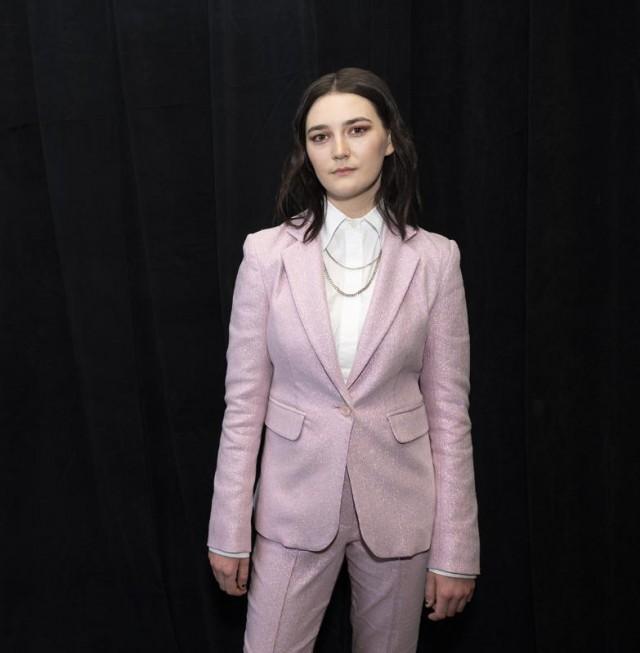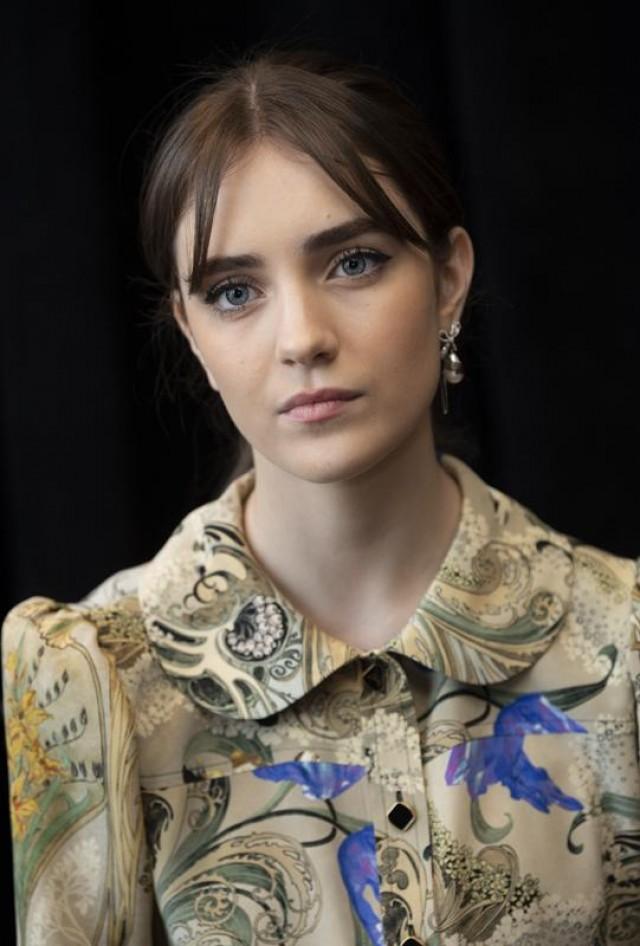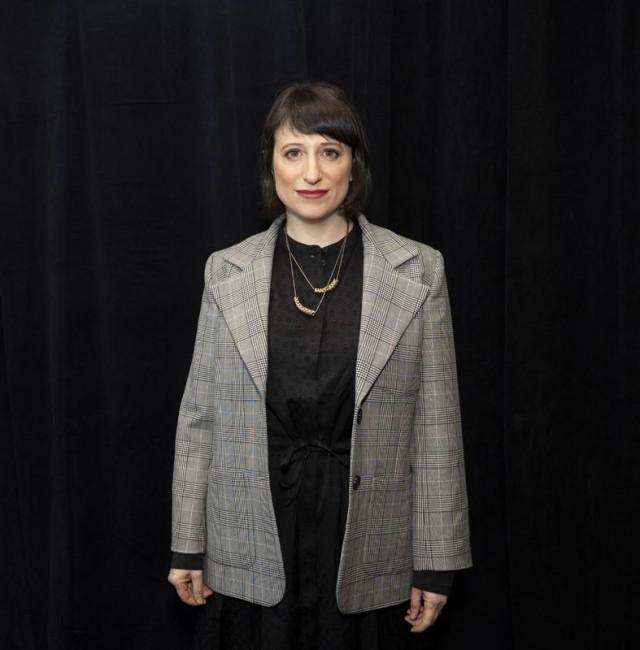Actresses of the movie ‘Never Rarely Sometimes Always’ on abortion and women’s rights
Los Angeles — Newcomers Sidney Flanigan, 21, and Talia Ryder, 17, are the two very promising young actresses in Eliza Hittman’s drama, “Never Rarely Sometimes Always.”
Written and directed by Hittman, "Never Rarely Sometimes Always" is the story of two young cousins from Pennsylvania, Autumn (Flanigan) and Skylar (Ryder), who go on a journey to New York City following an unplanned pregnancy in order to get an abortion. The movie won the Silver Bear Grand Jury Prize recently at the 70th Berlin International Film Festival.
Both from Buffalo, New York and both making their feature film debut, Flanigan and Ryder deliver very moving and memorable performances that make us believe these two ladies will go far in the business. Flanigan is also a musician while Ryder is set to appear next in Steven Spielberg’s “West Side Story.”
We interviewed the young actresses as well as director-writer Hittman in New York City and below are excerpts of our conversations with them:
Sidney Flanigan

The director told us that she just followed you on Facebook. Talk about your journey now that you are in your first feature film.
It's been incredibly surreal, but amazing. I never really thought I'd see myself at this level before and it's been a great learning experience —also, sometimes overwhelming but in a really good way. It's so exciting to get to be a part of something that's both creative but also important. I feel really useful and it's just very powerful.
What did you learn from making this movie?
The crisis centers. I was not aware of these places that mimic a doctor's office or a health center and try to sway women in the direction that they would prefer them to go into. I wasn't aware that these were a thing and that, there are people, there's politicians that fund these places and stuff and it's quite shocking.
Would you describe your acting as intuitive?
Yeah, I mean to some extent I feel it's intuitive. A lot comes from—I'm a musician, and a lot of the times when you write a song about something or you're singing or even if you're covering a song, I think you have to really play on the emotion of the song in order to really deliver it to somebody.
I just try to do the same with acting, and just try to figure out. "What is here that I'm trying to do or what am I feeling here?" And yeah. At the end of the day everybody draws a little bit from personal life experience, even if it isn't the exact same context as the scene.
You come from a very artistic family. Tell us more about your family.
My father is a singer, songwriter, and musician. Everyone in my mom's side, the family are, they're not all musicians necessarily, but they're enthusiasts of music very much.
I was raised on punk rock music. My grandmother was a punk rocker in the '70s, and my dad and my mother were punk rockers in the '90s. I was born into that.
I felt like I always had all of these aunts and uncles growing up, because they were just people who were musicians or friends in the music community who were always around that I'm still in touch with this day.
I do organize with them for shows in the Buffalo area. Then my grandfather, I never met him, actually, but he's a poet and I don't know where he is these days, but I've read his poems and they're very good.
What do you think about the woman’s right to choose?
It's extremely important that people should have body autonomy. They should be able to be like, "This is my body. It's my right to make that decision." Because at the end of the day, morality can be subjective. No matter what that means to you, you still shouldn't be allowed to tell somebody else what to do.
I love the friendship between the cousins in this movie. Do you have a friend like that whom you can trust?
Yeah, plenty. I'm very lucky to have the support system in my life that I do. But not everybody has that, and that's what's so unfortunate.
There have been many movies about abortion but none showed how a girl was questioned by the staff at the clinic about her personal life. How did you find this approach?
It's something I've seen in surveys or questionnaires. When I was in high school, we'd sometimes do these questionnaires or surveys that were trying to assess if kids felt safe in school or something like that, and they would list it off that way. So, it's something I've seen before.
But I didn't know that was something they do in Planned Parenthoods. So it was interesting to see that they assess it in that way, because I think it really does help open up conversation a little more than just a yes or a no. It was really amazing for Eliza to use that scene for the title of the movie. I thought it really spoke to it.
Talk about the support you get from your family.
My family and I are very close, and we talk about everything, but it hasn't always been that way. When you're a teenager you become really rebellious. Relationships are not very black and white, people aren't perfect. But at the end of the day, I still no matter what you go through, you know when your family is going to be there for you or your friends.
Real people that really care about you are always going to be there for you no matter what it is you're going through, or how they are feeling with you at the moment. It's one of those things that you just drop everything and you're just there for them.
This movie isn't only about abortion but about the angst that the younger kids go through. What do you think?
Yeah, to some extent. Her family life has a little bit to do with how her decisions were influenced. She obviously felt she couldn't talk to her mother, probably more so because of a fear of the stepdad. There's a lot of factors at play and a lot of traumas.
Obviously, families are very powerful in the sense that the environments we grow up in are going to highly affect us emotionally. So, it probably just made the experience much harder for her in that sense. But it doesn't change the fact that the problem with her getting the abortion wasn't her family, it's still the healthcare system.
What do you think are the pressing issues for young women these days?
I feel like this is actually tackled in the film with the idea of the male gaze. I feel like I'm tired of feeling like I'm in a hostile environment a lot of the time. I don't like that. I don't feel comfortable walking down the street at night. Every time I leave work, I have to make sure I have a coworker with me, taking the bus with me, and I walk with them down the street.
Sometimes even as a musician in the music world, you feel like you have to work twice as hard to be recognized for your work. Because it just seems, men just are the default, and people are more attracted to them as artists. Especially it seems it's a thing in the alternative rock scene a lot, where women aren't always viewed as like being rock and roll or something. Because it seems like it was a man's world for a while. There's a lot of amazing women who are breaking through that.
Talia Ryder

How was it like for you jumping into this, your first feature film?
Reading the script for the first time was really what solidified my wanting to be part of the project. I felt really compelled to be a part of this untold story. I really liked Eliza’s approach, she didn’t dramatize anything, and she just really honestly depicted that issue that many women struggle with.
So in your research for this movie, did you talk to any girls who were going to undergo abortion? What were their feelings and thoughts? How were they going to handle their parents?
One of the interesting things in the story is how blind the girls were going into this, because this wasn’t really something that they ever thought they would need to experience and I am an older sister myself, so I know what it’s like to feel the need to put yourself before someone else.
So no, we didn’t talk to anyone because for my character. I didn’t feel that was necessary. I felt that my sole purpose in the story and Autumn’s life was to just be her protector and to do whatever she needed. But Eliza really helped us dive into the script and made sure that we fully understood everything and the intentions behind what we were doing and saying.
Did you bond with Sidney?
We had a very short rehearsal process, like the time crunch that we were on with the film. But in a couple of days we had Eliza, really got Sidney and I close, which was cool.
Talk about your bonding with Sidney on the set.
Sidney is so cool and just a talented musician. And we are both passionate about art and she is just like a really chill person. So we got along very well and on some of our off days, we just did things like go vintage shopping and hung out and went to some concerts, so it was really nice.
Because I have heard from other people that not everyone is lucky enough to have a good off-set relationship with another actor, but we were really lucky and became good friends. We went to this concert, I think it’s called The Knitting Factory in Brooklyn. We were just trying to check out some cool spots.
Talk about your involvement in Steven Spielberg’s “West Side Story.”
I was really nervous. I was nervous into this and “West Side Story,” but in both projects, Eliza and Steven both made me feel like I am in a really safe environment and I got along great with the cast on both projects and they were both really fun and educational.
My biggest challenge on the set of “West Side Story” was the choreography. Justin Peck who is the choreographer, he choreographs for the New York City Ballet and he’s a genius. But in all of his movies, the dance steps are so intricate, that the choreography is incredible. But while it was so fun and amazing, it was difficult to learn all the steps and feel it in the space, but it was really cool.
Talk about women’s rights and the woman’s right to choose.
After doing this film and before, I am an advocate for people’s reproductive rights, not just limiting that to women.
With the laws that our country was set upon and the 14th Amendment the due process clause, I feel definitely grants women that right. I feel like that’s something that’s being chipped away at currently. More people need to understand the urgency behind making sure that this isn’t something that’s taken away from women because we live in a democratic nation and it’s important that that right is upheld.
What do you think the pro-life people are going to think of this movie?
I hope pro-life people see this movie and I hope this movie de-stigmatizes the issue of abortion and the issue of pregnancy, because I think what a lot of the people don’t realize is that it’s not always the woman’s fault; that Autumn, it doesn’t matter whether she was being irresponsible, it was out of her hands which was revealed in the movie. I hope they are able to empathize with the story rather than letting political thoughts get in the way.
Eliza Hittman

Talk about your journey to get to this subject and how this film came about?
Although the film is so timely, I began thinking about this story in 2012. I was editing my first feature film and I was reading a newspaper and I stumbled upon a headline that really struck me about the death of a woman in Ireland named Savita Halappanavar. I was devastated to find out that this woman passed away after being denied a lifesaving abortion.
I went out and I started to educate myself a bit better and I got a book called “Ireland’s Hidden Diaspora,” which is all about the journey that women would take from Ireland across the Irish Sea to London and back in one day to get an abortion.
The idea of that journey I found very compelling and it put images in my head of a woman on the run. And I wrote initially a treatment for that version and then I also began to think about the journey that women take in the United States because obviously I’m a U.S. filmmaker and I didn’t think anyone would let me make a movie set in Ireland.
And it was also an interesting research process learning about the journey in 2012, 2013 that women would take from rural areas into urban areas, specifically New York I was researching, for an abortion. And just thinking about how in our country it’s so difficult to access a legal abortion.
Did you talk to women as part of your research to do this movie?
I did a lot of interviewing of counselors and clinicians and abortion providers who meet with women. Because of patient confidentiality and privacy I wasn’t allowed to speak directly with anybody on that journey who would come into one of those clinics.
How did you discover your actresses and how did you handle anti-abortion groups?
We haven’t encountered any anti-abortion groups yet. I don’t know what will happen when the film opens this week but at the moment, we haven’t met the opposition.
How did I find the actresses? I met Sidney Flanagan, who plays Autumn, in 2012 or 2013. She was just 14 at the time and I was working on another film. And I really met her in passing but because she was dating somebody in this other movie we were working on, we added her on Facebook. And over the years, we just kind of watched her grow up on Facebook.
She’s an aspiring musician and posts a lot of DIY punk videos of herself playing music. And I was really mesmerized by them. And we would wait for the next video to turn up on Facebook, just her alone in her bedroom with her guitar. And I thought that they captured the pain and beauty of growing up, through her music.
And when we were casting the movie, we did a conventional casting approach where we saw hundreds of actresses in the system who work in Hollywood. And then we also did a non-traditional search and just through the search I kind of kept thinking about this random girl in western New York who I didn’t even know, who didn’t know me.
And then finally I said I think we should invite this girl to New York to audition and we did. And Talia came in through more of a conventional audition but coincidentally is from the same place as Sidney. So, I felt that that would be a beautiful foundation to begin to create their relationship and bond.
Were those real clinics that you shot at?
We shot at real Planned Parenthoods. So yeah there’s a lot of work that goes into having to show up at a location, shoot and then pack it all up and move. And that happens at every space you see depicted on screen. We tried to shoot lighter; the way that the film was conceived in terms of the camera department was very light and mobile to help navigate all of the locations. — LA, GMA News



